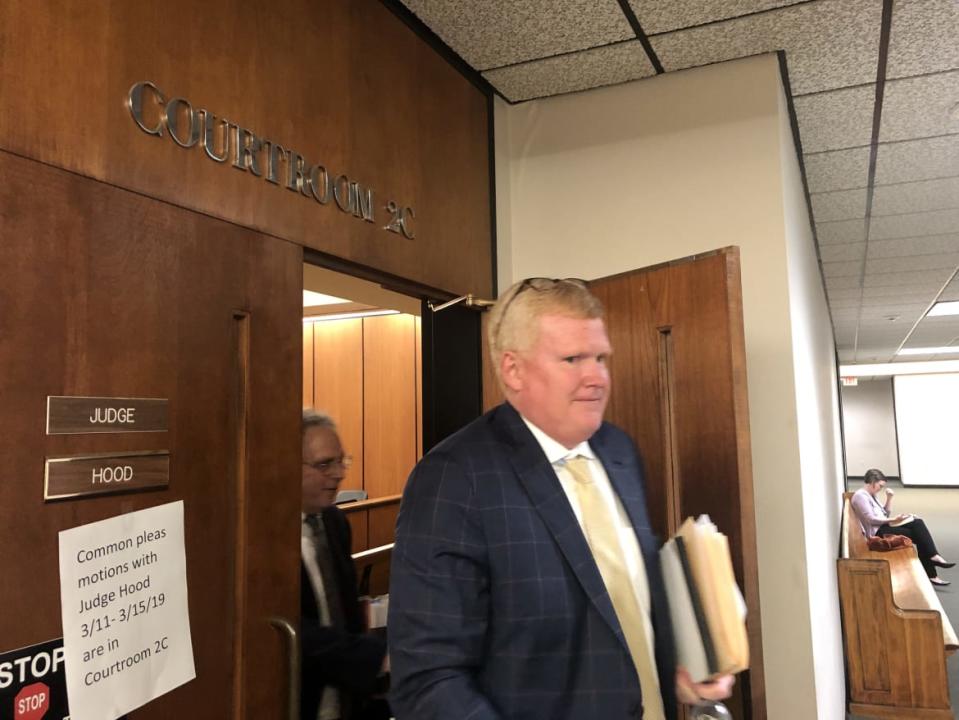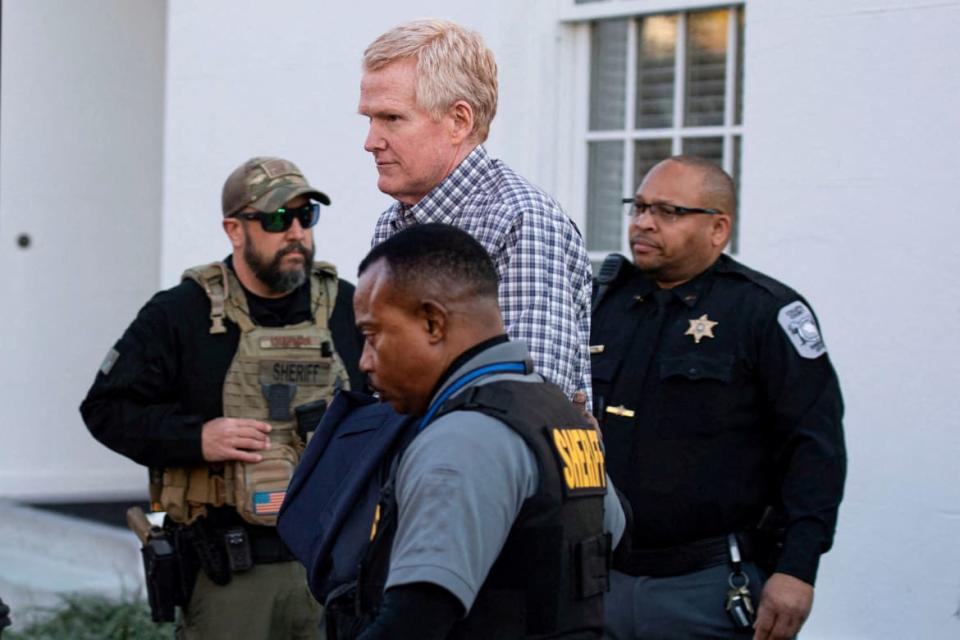How the Murdaugh Saga Unfolded—From a Boat Crash to Murder

For almost a century, the Murdaugh family was synonymous with the law in the South Carolina Lowcountry.
Members of the clan served as solicitors, or local prosecutors, in five counties before establishing one of the most prominent law firms in the area. But the image of power and influence began to crack about four years ago—when 22-year-old Paul Murdaugh drunkenly crashed a boat, killing a 19-year-old friend.
What happened next would obliterate the good Murdaugh name, leave two members of the family dead, and put a third on trial for their murders in a saga that has transfixed the nation for more than a year.
Prosecutors allege that Paul’s father Alex Murdaugh killed his son and his 52-year-old wife, Maggie—then months later paid an associate to kill him in a botched insurance fraud scheme.
“Ultimately, the murders served as Murdaugh’s means to shift the focus away from himself and buy himself some additional time to try and prevent his financial crimes from being uncovered, which—if revealed—would result in personal, legal, and financial ruin for Murdaugh,” prosecutors said in a December motion.
Murdaugh is now on trial in Colleton County for the double homicide, with testimony set to begin this week. The 53-year-old separately faces over 80 financial charges, another trial for the insurance plot, and has been named in a handful of lawsuits. He has pleaded not guilty to two counts of murder and two counts of possession of a weapon during the commission of a violent crime in connection with his wife and son’s 2021 murder.
Alex Murdaugh has arrived for day 3 of his trial. He is accused of killing his wife Maggie and his son Paul. Today we expect final jury selection and opening statements. @ABCNews4 Video: @grizz_2pt0 pic.twitter.com/k5u7pPNXrJ
— Tara Jabour (@TaraJabour) January 25, 2023
Defense lawyers insist Murdaugh is innocent, that he was with his ailing father at the time of the crime.
“Alex looks forward to this opportunity to clear his name of these heinous charges so that the Attorney General can finally begin looking for the actual killer or killers of Alex’s beloved wife and son,” attorneys Dick Harpootlian and Jim Griffin said in a statement to The Daily Beast.
In the run-up to the testimony, the defense filed several motions seeking to bar two expert prosecution witnesses from discussing blood spatter analysis on a white T-shirt Murdaugh wore the night of the murders, arguing it is a subjective science and that the garment was destroyed in forensic testing. The defense and prosecutors agreed Tuesday to delay the matter until the state decides whether to call those experts to the stand.
As jury selection began Monday, Judge Clifton Newman revealed that over 250 witnesses could be called for either side. Among them: dozens of law enforcement officers; several of Murdaugh’s alleged financial victims; members of the Murdaugh family; and Murdaugh’s co-defendant in the assisted suicide attempt, Curtis Edward Smith.
“He looks forward to telling the truth of what he knows,” Smith’s lawyer, Aimee J. Zmroczek, told The Daily Beast.
The path that led Alex Murdaugh to a seat at the defense table at the courthouse in Walterboro has been paved with tragedy after tragedy, bombshell after bombshell.
It began on Feb. 24, 2019, when Paul Murdaugh—after attending an oyster roast and stopping to get a few drinks—drunkenly crashed his dad’s 17-foot boat with five of his friends aboard. At least three passengers were launched into the water, including Mallory Beach, whose body was found a week later by two fishermen miles from the crash site.
The incident sent shock waves throughout Hampton County. Paul was charged with boating under the influence, and a lawsuit named his father.
The civil case sought Alex Murdaugh’s financial records—documents that would, prosecutors allege, show that he had “accrued substantial debts over a period of years and, to cover those debts, began engaging in illicit financial crimes involving theft and misappropriation of money from his clients and his own law firm.”
“If [the civil litigation motion] was granted as expected, that motion would have resulted in the exposure of Murdaugh’s financial records, which would itself have led to his misdeeds becoming known to others,” prosecutors said.

Alex Murdaugh leaves a hearing at the Richland County Courthouse in 2019.
On June 7, 2021, the pressure on Alex Murdaugh increased as he was asked by a law-firm colleague for “an explanation no later than that day as to where hundreds of thousands of dollars in legal fees owed to the firm but stolen by Murdaugh had gone,” prosecutors wrote. “Murdaugh had neither the money nor a plausible legal explanation with which to respond to the demand.”
But the questions about the missing money would have to wait.
Prosecutors say Murdaugh suddenly got a call that his dad had been taken to the hospital “with a very poor prognosis”—a scenario that threatened to ruin him because his father had loaned him money and cosigned his loans.
Just hours later, at 10:07 p.m., authorities say Alex Murdaugh called the police and reported his “wife and child have been shot” on their 1,770-acre Colleton County estate and they are not breathing.
Within seconds of officers arriving at the crime scene, Murdaugh was trying to suggest the “killer’s motive stemmed from the February 2019 boat wreck that resulted in the tragic death of Mallory Beach,” prosecutors noted.
“In fact, Murdaugh expressed certainty and stated he knew ‘that’s what it is’ [the boat crash] to the responding officer,” prosecutors wrote in court papers. “Thus, based on his own statements, Murdaugh placed into motion the issue from the outset of law enforcement’s investigation into the killings, and he tried to tie the motive to events that had occurred more than two years earlier.”
For three months after the double homicide, Alex Murdaugh was seen in the community “as the victim of an unspeakable tragedy”— which allegedly allowed him the time to figure out how to hide his other crimes.
“Everyone backed off their inquiries and rallied around him,” prosecutors said in the motion. “The day of reckoning vanished.”
Any relief was short-lived, however. On Sept. 2, 2021, another law staffer came across a check that was made out to Murdaugh instead of the firm, a discovery that renewed old questions and sparked an internal investigation that prompted the law firm to ask for his resignation the next day.
Two days later, Murdaugh allegedly resorted to drastic measures again. In a 911 call, he reported that he had been shot in the head while he was changing a tire on a remote backroad.
“People initially rallied to his aid again,” prosecutors said. “Only this time, the facts came to light a lot quicker.”
The holes in his story were bigger than the one in his head, and just nine days after calling the police, Murdaugh confessed to orchestrating a hit on himself in a bizarre scheme to secure a $10 million insurance payout for his surviving son, Buster. According to Murdaugh, he enlisted Curtis Edward Smith (whom he referred to as his drug dealer) to shoot him in the head. Both were charged in the shooting, along with money laundering and drug trafficking.
“I understand there may be concern I may be a danger to myself,” Murdaugh said during a December 2021 bond hearing. “I made a terrible decision that I regret and frankly I’m embarrassed about. I’m not in that place now.”

Alex Murdaugh is led out of the Colleton County Courthouse after day two of jury selection.
Smith has repeatedly denied Murdaugh’s version of the events, insisting that he was “set up.” He has also denied being Murdaugh’s drug dealer.
Murdaugh has since admitted he suffered a two-decade addiction to oxycontin. Memorial Health hospital records previously obtained by The Daily Beast show that Murdaugh had barbiturates and opiates in his system at the time of the botched hit—and he suffered from “two superficial appearing bullet wounds to the posterior scalp,” brain bleeding, and a skull fracture.
After he was released from the hospital, Murdaugh went to an Orlando rehab center and then was sent back to South Carolina to face a new charge: that he stole millions from the wrongful-death settlement for the sons of Gloria Satterfield, his former housekeeper.
After Satterfield died on Murdaugh’s property in February 2018, her sons say that Murdaugh suggested they sue him for insurance money. The Satterfield family believed that the unusual request was Murdaugh’s way of looking out for them after Gloria had worked with the family for years. Instead, Murdaugh diverted millions of dollars from the wrongful death settlement to a secret bank account. In June, Murdaugh admitted he owed the Satterfield sons the $4.3 million settlement—and authorities are looking into her cause of death.
The tangle of allegations prompted state authorities to re-open an investigation into the 2015 death of Stephen Smith, a 19-year-old aspiring nurse who was found on the side of the road. While the double-homicide investigation prompted authorities to re-examine Smith’s case, authorities have never publicly accused the Murdaugh family of wrongdoing or made an arrest.
According to South Carolina Highway Patrol records, however, early investigators probing Smith’s death unsuccessfully tried to pursue tips involving the Murdaugh family. The records first obtained by the Island Packet reportedly showed that several witnesses suggested that Murdaugh’s older son, Buster, may have been connected to Smith’s accident. None of those claims, however, were ever verified.
Smith’s twin sister also told authorities in 2015 that Murdaugh’s older brother, Randolph, called her family shortly after they learned the news of the incident. Stephanie Smith reportedly said that the elder Murdaugh “wanted to take the case, and it would be free of charge and everything.”
So the trial underway this week is unlikely to tie up all the loose ends in the Murdaugh mystery. Still, it will be “one of the most famous trials South Carolina’s ever seen,” as Eric Bland, the lawyer who represents Gloria Satterfield’s sons, put it.
Bland, an outspoken critic of Alex Murdaugh, is not convinced that the trial will have a neat ending.
“I don't think there's going to be a not guilty verdict,” Bland told WJCL. “But I think there could be a high likelihood of a hung jury. All they have to do is flip one or two jurors and it'll be a hung jury. And this is being tried in Alex's backyard—the Murdaugh family backyard.”
Got a tip? Send it to The Daily Beast here
Get the Daily Beast's biggest scoops and scandals delivered right to your inbox. Sign up now.
Stay informed and gain unlimited access to the Daily Beast's unmatched reporting. Subscribe now.

 money
money 